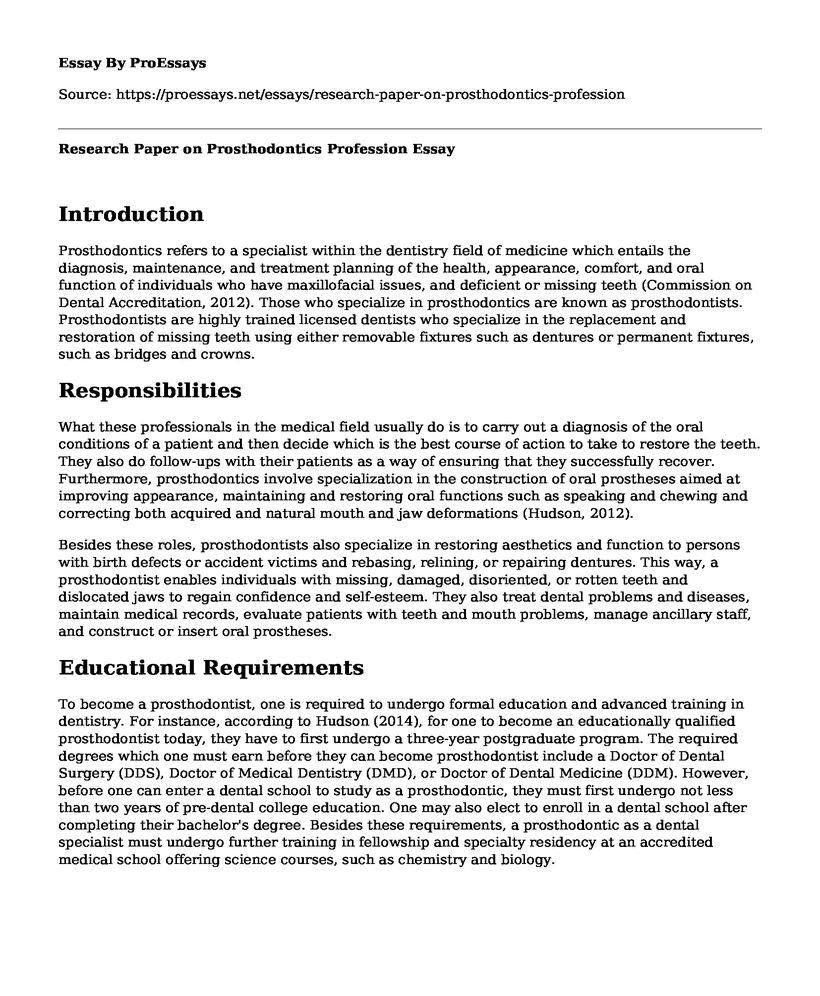Introduction
Prosthodontics refers to a specialist within the dentistry field of medicine which entails the diagnosis, maintenance, and treatment planning of the health, appearance, comfort, and oral function of individuals who have maxillofacial issues, and deficient or missing teeth (Commission on Dental Accreditation, 2012). Those who specialize in prosthodontics are known as prosthodontists. Prosthodontists are highly trained licensed dentists who specialize in the replacement and restoration of missing teeth using either removable fixtures such as dentures or permanent fixtures, such as bridges and crowns.
Responsibilities
What these professionals in the medical field usually do is to carry out a diagnosis of the oral conditions of a patient and then decide which is the best course of action to take to restore the teeth. They also do follow-ups with their patients as a way of ensuring that they successfully recover. Furthermore, prosthodontics involve specialization in the construction of oral prostheses aimed at improving appearance, maintaining and restoring oral functions such as speaking and chewing and correcting both acquired and natural mouth and jaw deformations (Hudson, 2012).
Besides these roles, prosthodontists also specialize in restoring aesthetics and function to persons with birth defects or accident victims and rebasing, relining, or repairing dentures. This way, a prosthodontist enables individuals with missing, damaged, disoriented, or rotten teeth and dislocated jaws to regain confidence and self-esteem. They also treat dental problems and diseases, maintain medical records, evaluate patients with teeth and mouth problems, manage ancillary staff, and construct or insert oral prostheses.
Educational Requirements
To become a prosthodontist, one is required to undergo formal education and advanced training in dentistry. For instance, according to Hudson (2014), for one to become an educationally qualified prosthodontist today, they have to first undergo a three-year postgraduate program. The required degrees which one must earn before they can become prosthodontist include a Doctor of Dental Surgery (DDS), Doctor of Medical Dentistry (DMD), or Doctor of Dental Medicine (DDM). However, before one can enter a dental school to study as a prosthodontic, they must first undergo not less than two years of pre-dental college education. One may also elect to enroll in a dental school after completing their bachelor's degree. Besides these requirements, a prosthodontic as a dental specialist must undergo further training in fellowship and specialty residency at an accredited medical school offering science courses, such as chemistry and biology.
Certification and Licensure
Additionally, to become cerfified by the state board of prosthodontics and allowed to practice as a prosthodontist, certification and state licensure are required. For one to obtain a license to practice as a prosthodontic, they must, upon graduation from a dental school complete a residency, pass the National Board Dental Examinations, and pass a practical exam to demonstrate their proficiency (Hudson, 2014). Becoming a board-certified prosthodontist also requires one to sit for and pass the American Board of Prosthodontists' certification exam.
Salary
According to the US the Bureau of Statistics, a prosthodontist's mean annual salary as of 2015 was $161,020. Hence, prosthodontics as one of the specialties in dentistry is a rewarding and fulfilling career that one should consider pursuing. Other alternative career options in the field of prosthodontics include periodontists, endodontists, and orthodontists. With education and training in prosthodontics, one may also elect to work as a physician or a dentist.
Special Assistant
Prosthodontists can have a specialized assistant known as a clinical or dental assistant for a Prosthodontist who works under the direct supervision of the prosthodontist. According to the American Dental Association (ADA) (2018), dental assistants are valuable members of the dental care team since they enhance the dentist's efficiency in the delivery of quality oral health. Some of their roles include assisting the prosthodontists during dental treatment procedures, assessing patients, taking impressions and radiographs of patients' teeth, educating patients on proper oral hygiene, and scheduling appointments with patients in need of the services of a prosthodontist. What their specialty entails in terms of education and training requirements include a formal education and training at dental schools, vocational schools, or community colleges, accreditation by the Commission on Dental Accreditation, and certification upon passing of the CDA examination (ADA, 2018).
References
American Dental Association. (2018). Dental assistant education and training requirements. Retrieved from https://www.ada.org/en/education-careers/careers-in-dentistry/dental-team-careers/dental-assistant
Commission on Dental Accreditation. (2012). Accreditation Standards for advanced specialty education programs in prosthodontics. Retrieved from https://www.ada.org/~/media/CODA/Files/2018_prostho.pdf?la=en
Hudson, J.D. (2014). Advanced prosthodontic training in the United States of America. Journal of Prosthodontic Research, 58(3), 145-149
Cite this page
Research Paper on Prosthodontics Profession . (2022, Jul 11). Retrieved from https://proessays.net/essays/research-paper-on-prosthodontics-profession
If you are the original author of this essay and no longer wish to have it published on the ProEssays website, please click below to request its removal:
- Breast and Cervical Cancer Intervention Program - Public Health Essay
- Research Paper on Health Effects of Low-Carbohydrate Diets Summary
- Integrity, Excellence and Accountability According to APTA Paper Example
- BACA1 and Alzheimer's Disease Paper Example
- Essay Sample on Professional Development, Social Impact, and International Reporting
- Essay Example on Gender-Based Violence: A Global Menace to Social, Health Wellbeing
- Essay Example on Modern Birth Control: Hormonal Contraception and its Benefits







